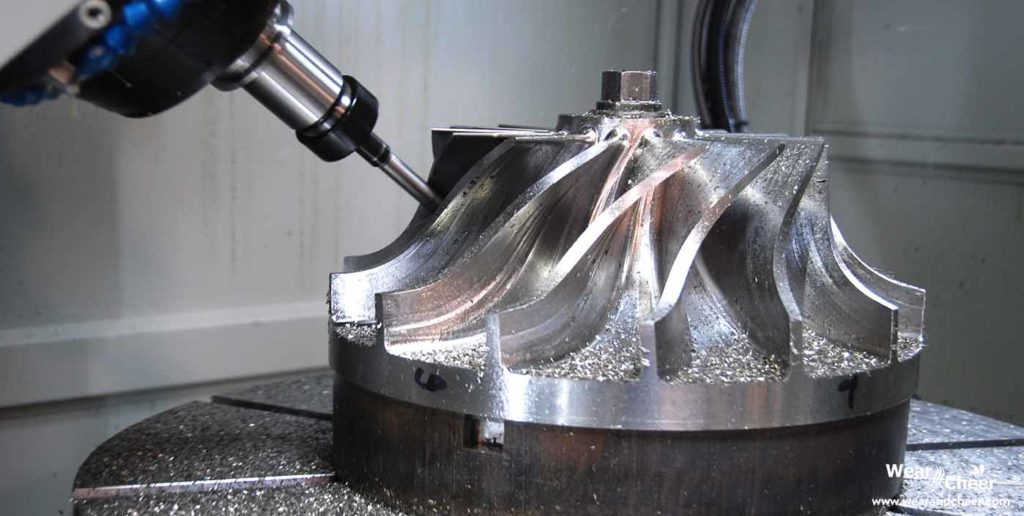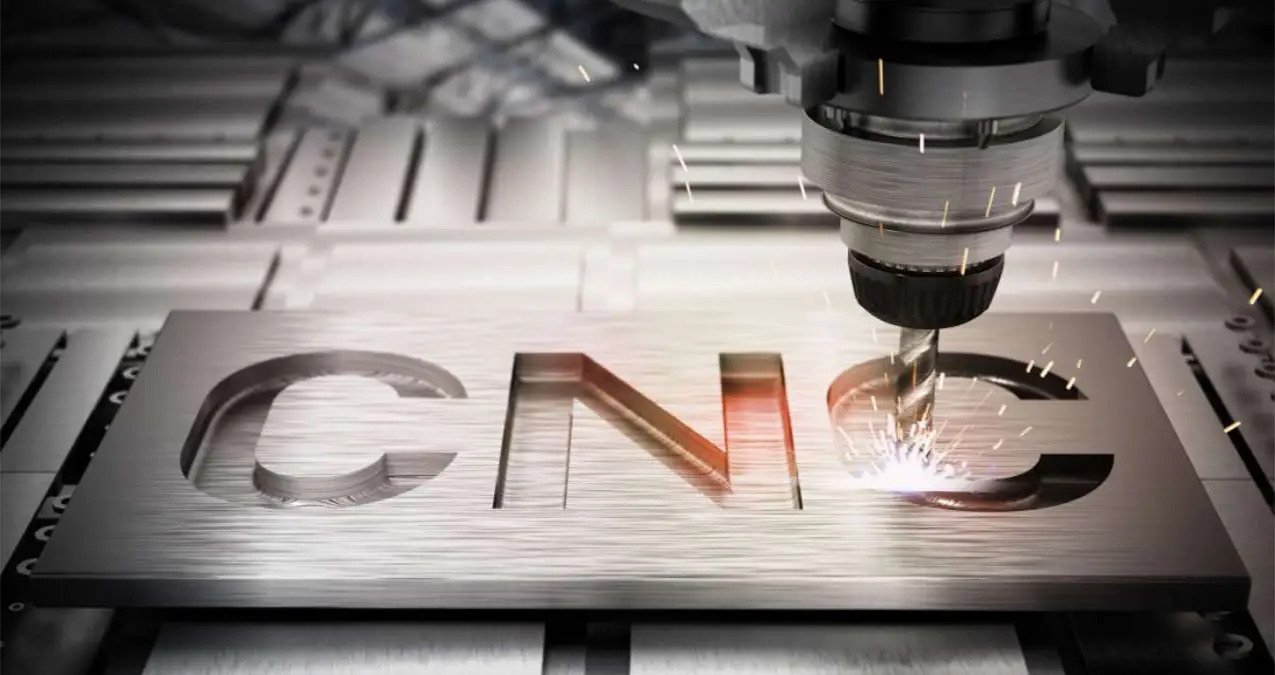How a tool and die maker ensures accuracy in engineering
Wiki Article
The Function of CNC Machining Providers in Modern Production and Design Solutions
CNC machining services have become essential in modern manufacturing and engineering. They give precision and efficiency, allowing the development of complicated elements with very little human oversight. This development not just minimizes production time and prices yet also attends to the increasing demands of various markets. As innovation develops, the landscape of CNC machining is readied to alter further - jig and fixture tooling. The ramifications of these growths necessitate closer examUnderstanding CNC Machining: A Summary
CNC machining, a cornerstone of modern-day manufacturing, entails making use of computer-controlled devices to precisely cut and form products. This modern technology incorporates advanced software application and equipment to automate the manufacturing procedure, ensuring high accuracy and performance. CNC, which represents Computer system Numerical Control, allows drivers to input detailed requirements that direct the device in carrying out complicated designs.Various products, including metal, plastic, and timber, can be machined, making CNC versatile throughout various sectors. The process begins with an electronic version, usually developed using CAD software program, which is equated right into maker language for implementation.
CNC machining includes numerous methods, such as milling, transforming, and exploration, each fit for details applications. The adoption of CNC technology has transformed production capacities, enabling suppliers to generate complex components with very little human intervention. As a result, it has actually come to be a vital component in sectors varying from aerospace to auto.
Advantages of CNC Machining in Manufacturing
CNC machining uses considerable benefits in manufacturing, specifically when it come to accuracy and precision, which enhances item high quality. Furthermore, it is affordable, enabling lowered manufacturing costs while preserving high requirements. Its convenience in managing different products even more highlights its worth in contemporary production procedures.Precision and Accuracy
In modern production, precision and accuracy are vital, and advanced machining methods play an essential duty in accomplishing these objectives. CNC machining services give unmatched consistency in production, enabling suppliers to create complicated parts with precise requirements. By using computer system numerical control, these equipments remove human mistake, guaranteeing that each part meets rigid resistances. The repeatability of CNC machining allows organizations to produce huge amounts of the same items without compromising top quality. Furthermore, advanced software made use of in CNC procedures permits fast changes and elaborate designs, boosting flexibility in the manufacturing process. Inevitably, the accuracy and accuracy provided by CNC machining substantially add to enhanced item integrity and efficiency, fostering advancement and meeting the ever-evolving needs of different sectors.Cost-Effectiveness
Cost-effectiveness sticks out as a considerable benefit of CNC machining in the manufacturing industry. By automating the machining process, business can decrease labor prices and lessen human mistake, which results in better effectiveness. CNC equipments operate continually and can produce components at a much faster price than standard techniques, eventually lowering production costs. Additionally, the precision used by CNC machining lowers material waste, guaranteeing that sources are used properly. As a result, companies can attain higher revenue margins while maintaining high-quality criteria. Furthermore, the capacity to produce complicated designs with minimal arrangement time additional boosts price performance. Overall, CNC machining presents a compelling solution for manufacturers looking for to enhance their procedures and continue to be competitive in a requiring market.Adaptability in Materials
Flexibility in materials is a trademark of modern-day CNC machining, enabling suppliers to deal with a vast variety important, consisting of steels, plastics, wood, and composites. This ability allows the manufacturing of varied parts tailored to details application requirements. For instance, light weight aluminum and stainless-steel can be machined for durable commercial parts, while plastics are optimal for lightweight and corrosion-resistant applications. Wood machining accommodates the furnishings and decorative sectors, while composites supply strength-to-weight benefits in aerospace and automotive markets. The capacity to switch over between materials without significant reconfiguration improves operations efficiency and reduces lead times. Eventually, this convenience encourages producers to innovate and satisfy progressing market needs, strengthening CNC machining's duty as a foundation of modern-day design solutions.Key Industries Benefiting From CNC Machining Services
CNC machining services play an essential function in numerous key markets, specifically aerospace and defense, in addition to vehicle element production. These industries count on the precision and effectiveness of CNC technology to meet strict high quality and security criteria. The capacity to produce complex components with tight tolerances settings CNC machining as an important device in contemporary manufacturing.Aerospace and Protection Applications
In the high-stakes domain of aerospace and blog integrity, accuracy and defense are vital, making CNC machining solutions crucial. These solutions make it possible for the production of complex components with exacting tolerances, essential for aircraft, satellites, and army devices. CNC machining facilitates the creation of lightweight yet durable parts, commonly making use of innovative materials such as titanium and carbon fiber. The capacity to quickly prototype and manufacture elements increases the development cycle, making certain that crucial systems are both reliable and reliable. Additionally, CNC innovation improves repeatability, minimizing the danger of human error and ensuring constant quality across big production runs. As the aerospace and protection industries increasingly embrace automation, CNC machining solutions will remain to play a crucial duty in conference stringent regulatory requirements and functional needs.Automotive Element Manufacturing
The automotive market, much like aerospace and defense, relies greatly on precision engineering to satisfy the demands of contemporary manufacturing. CNC machining solutions play a vital role in producing high-grade auto components, such as engine parts, transmission housings, and custom-made fittings. These services enable suppliers to achieve intricate geometries and limited resistances, important for enhancing car efficiency and safety. The capacity to swiftly adapt layouts and create models via CNC machining increases development within the industry. Additionally, the scalability of CNC machining allows for both tiny batch manufacturing and large-scale production, providing to diverse market requirements. As independent and electric lorries gain traction, the dependence on CNC machining is poised to expand, even more strengthening its relevance in automotive part production.The CNC Machining Process: From Layout to Production
Changing a digital design right into a tangible product entails a collection of precise steps in the CNC machining process. Engineers make use of computer-aided style (CAD) software to develop a comprehensive electronic model of the preferred element. This model is then converted into a style suitable with CNC machines, commonly through computer-aided production (CAM) software program. The CNC equipment translates this information to direct its procedures.When the style is prepared, the selected product is protected in the CNC equipment. The machining process begins, involving numerous methods such as milling, turning, and drilling, where devices eliminate material to shape the part according to specifications. Throughout production, the equipment continually adjusts and keeps track of for precision, guaranteeing the last item meets the style requirements.
After machining, parts go through finishing processes such as sanding or covering to improve functionality and aesthetic appeals. This systematic strategy guarantees that high-grade components are created efficiently and accurately.
Developments and Trends in CNC Machining Innovation
As improvements in innovation continue to form the manufacturing landscape, CNC machining is experiencing significant innovations that boost efficiency and accuracy. One famous trend is the combination of artificial knowledge and equipment discovering, allowing adaptive machining procedures that enhance device courses and reduce cycle times. Furthermore, the fostering of advanced products, such as composites and lightweight alloys, increases the capabilities of CNC equipments, permitting the manufacturing of intricate geometries with higher strength-to-weight proportions.Cloud computing and IoT (Internet of Points) technologies facilitate real-time monitoring and data analysis, leading to predictive maintenance and decreasing downtime. Automation through robotics is also becoming progressively prevalent, enhancing and improving operations safety and security in manufacturing environments. The rise of 5-axis machining uses unparalleled versatility and precision, making it possible for the creation of intricate parts in a you could look here solitary setup. These developments collectively position CNC machining at the center of modern production services.

Future Outlook: The Progressing Function of CNC Machining in Design Solutions
CNC machining is positioned to play a progressively necessary function in engineering services as sectors embrace advanced modern technologies and progressing market demands. As automation and wise production gain traction, CNC machining solutions are anticipated to integrate with Internet of Things (IoT) devices and artificial knowledge (AI) to boost accuracy and efficiency. This integration will certainly permit click to read more real-time surveillance and anticipating maintenance, minimizing downtime and enhancing manufacturing effectiveness.The increase of tailored production will certainly necessitate even more flexible CNC systems capable of adapting to small batch manufacturing with rapid turn-around times. Sustainability problems will certainly also drive advancements in CNC machining, triggering the development of green products and procedures.
Eventually, CNC machining will certainly remain to progress, addressing the complexities of modern-day design difficulties while giving cost-effective and scalable options that fulfill the diverse demands of industries varying from aerospace to medical care.
Regularly Asked Concerns
What Materials Can CNC Machining Work With?
CNC machining can collaborate with a selection of materials, consisting of metals like aluminum, titanium, and steel, along with plastics such as acrylic and nylon. In addition, timber and compounds are additionally ideal for CNC machining procedures.Exactly how Do I Pick a CNC Machining Provider?
When selecting a CNC machining service supplier, one ought to consider their experience, equipment quality, material capacities, customer testimonials, turn-around times, and pricing. A thorough contrast ensures the chosen copyright satisfies particular project demands properly.What Is the Common Turnaround Time for CNC Machining Projects?
Normal turn-around times for CNC machining tasks vary, frequently varying from a few days to numerous weeks, relying on project intricacy, material availability, and the company's workload. Timelines must be confirmed straight with the picked supplier.Exist Minimum Order Quantities for CNC Machining Providers?

Exactly How Does CNC Machining Ensure Precision and Accuracy in Manufacturing?
CNC machining assurances accuracy and accuracy via computer-controlled procedures, which minimize human error. Advanced software application and premium equipment facilitate exact dimensions, consistent duplication, and detailed designs, causing remarkable components that meet rigorous specs and resistances.CNC machining, a cornerstone of modern production, involves the use of computer-controlled tools to exactly reduce and form materials. CNC machining services offer unparalleled consistency in manufacturing, allowing makers to produce complicated components with specific specifications. CNC machining solutions play a necessary function in different vital markets, specifically aerospace and protection, as well as auto element manufacturing. Additionally, the scalability of CNC machining permits for both little batch manufacturing and large-scale manufacturing, providing to varied market demands. As automation and wise manufacturing gain grip, CNC machining services are anticipated to integrate with Net of Things (IoT) devices and fabricated intelligence (AI) to improve accuracy and effectiveness.
Report this wiki page